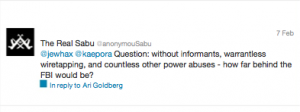Spooky AssadLeaks: The Nir Rosen Connection
Something curious has happened in the last few days while I’ve been traveling. The Guardian and Al Arabiya have been publishing leaked emails from Bashar al-Assad and his wife, showing both to be callous assholes but not otherwise producing a smoking gun (though I do hope to return to what they show about how they evaded sanctions).
In the last day or so, attention has shifted to two emails (here’s a translation of the first) between Assad aides and Assad, mentioning the journalist Nir Rosen. A number of people read them to suggest Rosen was an agent of Assad’s, perhaps even exposing other Western journalists who were sneaking into Syria.
Rosen responded to the allegations here, saying in part,
I believe the trove of leaked emails from the Syrian government are indeed all real. The emails which contain my name are certainly real, I don’t mind saying. They are from people who were introduced to me and other western journalists as media and public relations advisers to the Syrian government or the president himself. They are the same people who arranged for the ABC News interview with Barbara Walters, for the Sunday Times interview with Bashar al Assad, for Agence France Presse, and for others to enter Syria. This is normal. How else does a journalist enter a country such as Syria?
In November 2011 after al Jazeera conducted a live interview with Iran’s president Ahmedinajad, I tried to persuade media advisers to the Syrian president that they should grant a similar one to al Jazeera’s English network. I sent them several emails trying to persuade them it was a good idea, including an email with my CV and biography. I also met with these media officials to try to persuade them.
And as this November email also shows, I forwarded them a link to a BBC program on Syria done by the heroic Paul Wood in order to try to persuade them that journalists are coming in anyway and they might as well let al Jazeera in formally.
Importantly, the fact that I had to send my resume and biography to establish my credentials for an interview bid with Assad and the very need for sending these things shows I was not an agent for them.
I suspect all sorts of people will continue to focus on Rosen.
If you haven’t been following his work, a number of people have pointed to Rosen as one of the very few people giving a nuanced picture of what is going on in Syria right now. As an example, in this Q&A he talks about the stalemate-degrading-into-civil-war Syria is in right now.
Only a “Hama” could change the equation. Nobody can say exactly what that would entail, because “Hama” has become an epithet, a symbol, it just means for something terrible to happen. So, until now there is no Hama-type event that the opposition or international media could use to give leaders in Turkey or the West a pretext for humanitarian intervention or to delegitimise the country’s leadership. Such an incident would have to be so grave that international opponents would use it to obliterate the Russian and Chinese veto in the United Nations, and to criminalise those two countries for their backing of the Syrian regime.
In any case, that’s the Nir Rosen background to the emails.
All of which led me to ask where the emails came from. I have no doubt they’re real (or at least most of them)–Rosen has confirmed the emails mentioning him appear to be real. Here’s the Guardian’s description of who did and did not confirm the authenticity of emails involving them.
But having the entire contents of one or two email inboxes is not the same as reliably understanding how they came to be obtained and published. That’s the question I’d like to look at in more detail in a follow-up post.


